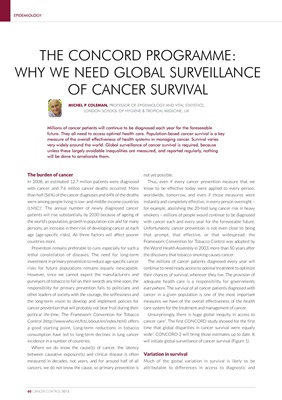
EPIDEMIOLOGY
THE CONCORD PROGRAMME:
WHY WE NEED GLOBAL SURVEILLANCE
OF CANCER SURVIVAL
MICHEL P COLEMAN, PROFESSOR OF EPIDEMIOLOGY AND VITAL STATISTICS,
LONDON SCHOOL OF HYGIENE & TROPICAL MEDICINE, UK
Millions of cancer patients will continue to be diagnosed each year for the foreseeable
future. They all need to access optimal health care. Population-based cancer survival is a key
measure of the overall effectiveness of health systems in managing cancer. Survival varies
very widely around the world. Global surveillance of cancer survival is required, because
unless these largely avoidable inequalities are measured, and reported regularly, nothing
will be done to ameliorate them.
The burden of cancer not yet possible.
In 2008, an estimated 12.7 million patients were diagnosed Thus, even if every cancer prevention measure that we
with cancer, and 7.6 million cancer deaths occurred. More know to be effective today were applied to every person,
than half (56%) of the cancer diagnoses and 64% of the deaths worldwide, tomorrow, and even if those measures were
were among people living in low- and middle-income countries instantly and completely effective, in every person overnight –
(LMIC)1. The annual number of newly diagnosed cancer for example, abolishing the 20-fold lung cancer risk in heavy
patients will rise substantially by 2030 because of ageing of smokers – millions of people would continue to be diagnosed
the world’s population, growth in population size and for many with cancer each and every year for the foreseeable future.
persons, an increase in their risk of developing cancer at each Unfortunately, cancer prevention is not even close to being
age (age-specific risks). All three factors will affect poorer that prompt, that effective, or that widespread: the
countries more. Framework Convention for Tobacco Control was adopted by
Prevention remains preferable to cure, especially for such a the World Health Assembly in 2003, more than 50 years after
lethal constellation of diseases. The need for long-term the discovery that tobacco smoking causes cancer.
investment in primary prevention to reduce age-specific cancer The millions of cancer patients diagnosed every year will
risks for future populations remains equally inescapable. continue to need ready access to optimal treatment to optimize
However, since we cannot expect the manufacturers and their chances of survival, wherever they live. The provision of
purveyors of tobacco to fall on their swords any time soon, the adequate health care is a responsibility for governments
responsibility for primary prevention falls to politicians and everywhere. The survival of all cancer patients diagnosed with
other leaders of society with the courage, the selflessness and cancer in a given population is one of the most important
the long-term vision to develop and implement policies for measures we have of the overall effectiveness of the health
cancer prevention that will probably not bear fruit during their care system for the treatment and management of cancer.
political life-time. The Framework Convention for Tobacco Unsurprisingly, there is huge global inequity in access to
Control (http://www.who.int/fctc/about/en/index.html) offers cancer care2. The first CONCORD study showed for the first
a good starting point. Long-term reductions in tobacco time that global disparities in cancer survival were equally
consumption have led to long-term declines in lung cancer wide3. CONCORD-2 will bring those estimates up to date. It
incidence in a number of countries. will initiate global surveillance of cancer survival (Figure 1).
Where we do know the cause(s) of cancer, the latency
between causative exposure(s) and clinical disease is often Variation in survival
measured in decades, not years, and for around half of all Much of the global variation in survival is likely to be
cancers, we do not know the cause, so primary prevention is attributable to differences in access to diagnostic and
60 CANCER CONTROL 2013